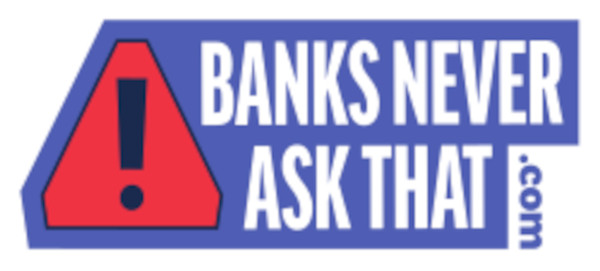
Can You Spot a Phishing Scam?
Every day, thousands of people fall victim to fraudulent emails, texts and calls from scammers pretending to be their bank. And in this time of expanded use of online and mobile banking, the problem is only growing worse. In fact, the Federal Trade Commission’s report on fraud estimates that American consumers lost a staggering $10 billion to phishing scams and other fraud in 2023—an increase of 13.6% over 2022.
It’s time to put scammers in their place.
Online scams aren’t so scary when you know what to look for. And at WCF Financial Bank, we’re committed to helping you spot them as an extra layer of protection for your account. We’ve joined with the American Bankers Association and banks across the country in a nationwide effort to fight phishing—one scam at a time.
We want every bank customer to become a pro at spotting a phishing scam—and stop bank impostors in their tracks. It starts with these four words: Banks Never Ask That. Because when you know something sounds suspicious, you’ll be less likely to be fooled.
These four phishing scams are full of red flags:
- Text Message: If you receive a text message from someone claiming to be your bank asking you to sign in, or offer up your personal information, it’s a scam. Banks Never Ask That.
- Email: Watch out for emails that ask you to click a suspicious link or provide personal information. The sender may claim to be someone from your bank, but it’s a scam. Banks Never Ask That.
- Phone Call: Would your bank ever call you to verify your account number. No! Banks Never Ask That. If you’re ever in doubt that the caller is legitimate, just hang up and call the bank directly at a number you trust.
- Payment Apps: Beware of text messages from someone claiming to be your bank saying your account has been hacked. The scammer may ask you to send money to a new account they’ve created for you, but that’s a scam! Banks Never Ask That.
You’ve probably seen some of these scams before. But that doesn’t stop a scammer from trying. For tips, videos and an interactive game to help you keep phishing criminals at bay, visit www.BanksNeverAskThat.com. And be sure to share the webpage with your friends and family.
Do You Practice Safe Checks?
It should come as easily as airline safety, so buckle up for this one. Despite the fact that check use has declined by 25%, reports of check fraud have soared. In fact, they’ve nearly doubled since 2021. Criminals are becoming more sophisticated and finding new ways to steal your financial information to gain access to, and fly off with your money. WCF Financial Bank is committed to helping our customers use checks safely.
Don’t give criminals the runway: Understanding the tactics they use can be your first line of defense.
Criminals are known to raid mailboxes and take off with checks so they can alter them and steal your money. One way to prevent this from happening is by not leaving your mail in your mailbox overnight or for long periods of time. If you’re heading out of town, you can pause your mail delivery for peace of mind. If you’re sending a check in the mail, don’t drop it in your mailbox. Instead, mail it from a USPS location to ensure it lands safely.
If criminals get ahold of your check, they could use what’s known as check washing. Chemicals are used to “wash” checks, erasing and rewriting details to siphon funds into their own accounts. Lastly, if a criminal gets ahold of your account and routing number, they can stow that information away, and easily steal your money by creating counterfeit checks using modern printers and software.
Remember, every time you write a check, you expose your personal information, such as your name, contact information and bank account number. If digital banking options aren’t an option, keep these tips in mind to practice check safety:
- Use Permanent Gel Pens: Just like wearing a seatbelt when you fly, use permanent ink when you write a check to protect yourself.
- Avoid Blank Spaces: Make sure you fill out every blank space on a check so criminals can't fill them in instead.
- Withhold Personal Information: The person in the middle seat doesn't need to know your whole life story, just like you don't need to add personal info to your checks.
- Review Accounts: Monitor your account activity online or in the WCF Mobile App as attentively as you await a safe arrival message from a loved one. Regular reviews ensure you quickly notice anything out of the ordinary.
- Check Your Checks: Regularly review your paid checks online and in our app. Ensure the endorsement is correct and reflects the intended payee and amount to guard against fraud.
- Use Digital Payment Options: Consider switching to the WCF Mobile App or online bill pay for fast and secure payments.
- Follow Up: Just as you confirm your flight details, make sure to follow up with payees to confirm they've received and deposited your check.


